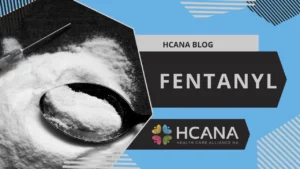Fentanyl is an extremely potent synthetic opioid painkiller. It’s usually used to treat patients with chronic cancer pain that is unresponsive to other measures. But why is fentanyl so dangerous? This substance is addictive, leading the Drug Enforcement Administration (DEA) to categorize it as one of the most dangerous drugs in existence at this moment.
Although fentanyl doesn’t have any street names like heroin or cocaine, its widespread use and high potential for abuse has made it a household name. Fentanyl has already taken numerous lives and left countless others destroyed by addiction. So why is fentanyl so dangerous? If you don’t know how dangerous fentanyl is, read on to find out more about its properties, side effects, consequences of prolonged use.

What is Fentanyl?
Fentanyl is an opioid painkiller that is used to treat patients with severe, chronic pain. It is also used for patients with acute pain, such as those recovering from surgery, but it has a low therapeutic index (the amount of fentanyl that is required to produce a therapeutic effect vs. an overdose effect) in these patients. But why is fentanyl so dangerous?
Fentanyl is similar to other opioids like oxycodone, hydrocodone, morphine, and others in that they are all extremely addictive and dangerous; however, fentanyl is 50 to 100 times more potent than morphine, so it’s extremely powerful. Because it is so potent, it can be extremely dangerous in the right (or wrong) hands.
How is Fentanyl Made and Used?
Fentanyl is an opioid-based pain medication that is used to treat severe and chronic pain. It’s a highly addictive drug that can be fatal even in small doses, which makes it a risk for patients and recreational users alike. Fentanyl is used as a patch that is stuck on the skin, as a lozenge that is placed in the mouth, as a lollipop with a round patch inside, as a nasal spray, or as an injection. The substance is prescribed to cancer patients or others with debilitating pain that doesn’t respond to other treatments. Fentanyl is also illegally produced and sold on the streets as a high-strength heroin substitute.
What are the Short-Term Effects of Fentanyl?
Fentanyl has short-term effects that are similar to many other opioid drugs. It can cause a buildup of mucus in the back of the nose and throat, and the lozenges are particularly notorious for this side effect. It can also cause the following short-term effects:
- Dry mouth
- Itching
- Sweating
- Dizziness
- Nausea and vomiting
- Respiratory depression
- Constipation
- Headache
- Sleepiness
- Unconsciousness

What are the Long-Term Effects of Fentanyl?
Over time, continued use of fentanyl can lead to dependence and withdrawal symptoms. Abruptly stopping use can lead to severe symptoms, including:
- Severe anxiety
- Seizures
- Sweating and chills
- Muscle cramps
- Diarrhea
- Bone and joint pain
- Extreme restlessness
- Disorientation
- Hallucinations
- Mood swings
- Severe nausea and vomiting
- Shortness of breath
- Paranoia
- Suicidal thoughts
- Irregular heartbeat
- Cardiac arrest
Is Fentanyl Addictive?
Yes, fentanyl is highly addictive. It’s estimated that 20% of people who take opioids for chronic pain will become addicted. People with a history of substance abuse, mental illnesses, and family members who have a history of substance abuse are at an increased risk of addiction.
The substance is particularly addictive because it’s easy to misuse, and it’s extremely easy to overdose on. Fentanyl is dangerous because of its high potency. People often don’t realize how much they’re taking because a small amount can have a strong effect. In fact, the chance of a fentanyl overdose is so high that the risk is even higher than with other opioids like heroin.

Why is Fentanyl So Dangerous?
When asking yourself “Why is fentanyl so dangerous?” there are important factors to consider. Fentanyl is incredibly dangerous because a small amount is enough to overdose and even die. When people take it, they may not know how much they’re taking, or they may not be using it as prescribed. This can lead to an overdose, which can end in death.
Also, fentanyl sold on the street may be mixed with other substances, and these substances may be deadly. People also have a higher chance of an overdose if they take fentanyl with other substances like alcohol or prescription painkillers.
Knoxville Recovery Center Can Help
Fentanyl is extremely addictive, if you or someone you love is struggling with drug abuse or addiction, don’t hesitate to seek help.
Fortunately, help is available for those battling addiction and/or mental health issues. Knoxville Recovery Center offers various services to those struggling in any stage of addiction or mental illness.
Addiction Treatment Services Offered
Detox Services
Our on-site detox clinic accommodates and supports clients as the body sheds all residual traces of addictive substances. Clients are under medical supervision during the detox process to ensure that they remain safe and comfortable.
Addiction Treatment
During our addiction treatment program, clients will engage in introductory therapies and exercises that work to prepare them for continued, more intensive treatment outside of our facility. The goal of our addiction treatment track is to stabilize clients so that they are treatment-ready.
Mental Health Treatment
Our mental health treatment program introduces behavioral therapies rooted in self-expression and holistic exercise. Art therapy, music therapy, and yoga are just a few forms of therapy we offer at the center. Our goal is to help the client reclaim their voice and expose them to treatment within a professional facility.
Aftercare Planning
Aftercare Treatment is designed for individuals who have benefitted from our introductory addiction services and are transitioning into a more intensive addiction treatment program. Once a client is stabilized, they will be encouraged to pursue continued addiction treatment. Our experienced case managers will then work with our clients to place them in a program that addresses their specific wants and needs.
If you feel that you or a loved one is struggling and needs help, our specialists are on standby and ready to help. Call Knoxville Recovery Center and speak with an expert today.









